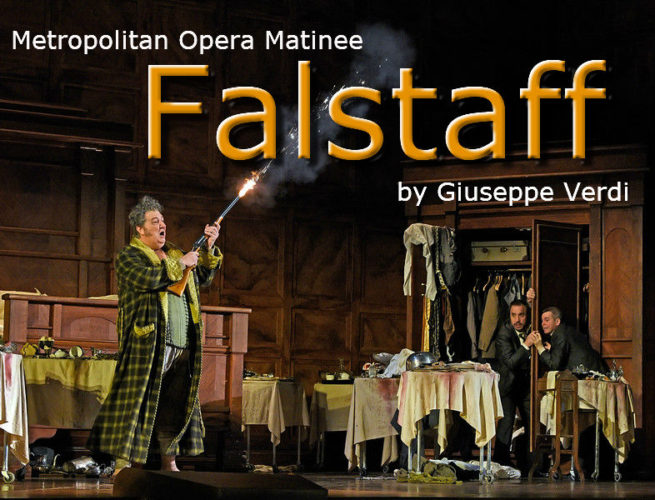Sat. 1 pm. ET- Falstaff by Giuseppe Verdi on the Metropolitan Opera Matinee. Falstaff (Italian pronunciation: [ˈfalstaf]) is a comic opera in three acts by the Italian composer Giuseppe Verdi. The libretto was adapted by Arrigo Boito from Shakespeare’s The Merry Wives of Windsor and scenes from Henry IV, parts 1 and 2. The work premiered on 9 February 1893 at La Scala, Milan. WRUU – 107.5 is Savannah’s home now for this radio tradition that goes back to 1931. 03/16/2019


WRUU – 107.5 is Savannah’s home now for this radio tradition that goes back to 1931.
Falstaff by Giuseppe Verdi on the Metropolitan Opera Matinee. Falstaff (Italian pronunciation: [ˈfalstaf]) is a comic opera in three acts by the Italian composer Giuseppe Verdi. The libretto was adapted by Arrigo Boito from Shakespeare‘s The Merry Wives of Windsor and scenes from Henry IV, parts 1 and 2. The work premiered on 9 February 1893 at La Scala, Milan.
Verdi wrote Falstaff, which was the last of his 28 operas, as he was approaching the age of 80. It was his second comedy, and his third work based on a Shakespeare play, following Macbeth and Otello. The plot revolves around the thwarted, sometimes farcical, efforts of the fat knight, Sir John Falstaff, to seduce two married women to gain access to their husbands’ wealth. [https://en.wikipedia.org/wiki/Falstaff_(opera)]
Sir John Falstaff is a fictional character who is mentioned in four plays by William Shakespeare and appears on stage in three of them. His significance as a fully developed character in Shakespeare is primarily formed in the plays Henry IV, Part 1 and Part 2, where he is a companion to Prince Hal, the future King Henry V. A notable eulogy for Falstaff is presented in Act II, Scene III of Henry V, where Falstaff does not appear as a character on stage, as enacted by Mistress Quickly in terms that some scholars have ascribed to Plato’s description of the death of Socrates after drinking hemlock. By comparison, in The Merry Wives of Windsor, Falstaff is presented by Shakespeare as the buffoonish suitor of two married women.
Though primarily a comic figure, Falstaff still embodies a kind of depth common to Shakespeare’s major characters. A fat, vain, boastful, and cowardly knight, he spends most of his time drinking at the Boar’s Head Inn with petty criminals, living on stolen or borrowed money. Falstaff leads the apparently wayward Prince Hal into trouble, and is ultimately repudiated after Hal becomes king. Falstaff has since appeared in other media, notably in operas by Giuseppe Verdi, Ralph Vaughan Williams, and Otto Nicolai, and in Orson Welles‘ 1966 film Chimes at Midnight. The operas focus on his role in The Merry Wives of Windsor, while the film adapts from the Henriad and The Merry Wives. Welles, who played Falstaff in his film, considered the character to be “Shakespeare’s greatest creation”.[1] [From Wikipedia, the free encyclopedia]

